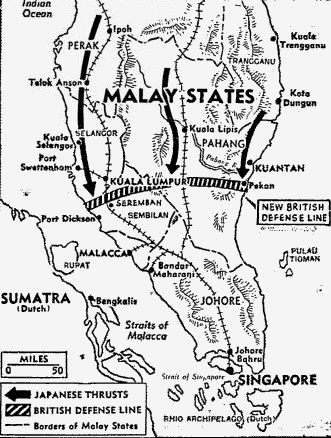The Pittsburgh Press (January 12, 1942)
British fall back to new defense line

With Kuala Lumpur in the hands of the Japanese, British forces have fallen back on a new line which is 160 miles north of Singapore. The new line is based on Seremban. Little action has been reported from the eastern Malayan coast.
Kuala Lumpur falls –
British defend new positions
Japs press close behind retiring troops
By Harold Guard, United Press staff writer
Singapore, Jan. 12 –
British Empire forces are being withdrawn to a new line north of Seremban, 30 miles south of Kuala Lumpur, before a ferocious Japanese tank-led offensive, a Malaya command communiqué said today.
Fighting was savage as the Japanese infantry, following close behind the tanks, pressed loose on the retiring British troops and swarms of Japanese dive bombing planes bombed and machine-gunned troop positions, roads and the railroads.
Seremban, on the main Singapore railroad, is in Negeri Sembilan state of the Federated Malay States, only 160 miles northwest of Singapore. The communiqué implied that the Imperial Command had decided to abandon Kuala Lumpur, Malaya’s second city and capital of the Federated Malay States, and the important Port Swettenham on the coast. Japs claimed its occupation yesterday.
Japanese planes opened a furious attack today on the Singapore area and the communiqué said there had been “a number” of raids. Preliminary reports showed no damage and only two casualties, as the result of the first raids, the communiqué said, and details of later raids were not yet available.
British fighter planes challenged the raiders, with what result remained to be ascertained.
It was disclosed that nine Japanese dressed as Malayans had landed from fishing boats on the coast of the Johor Sultanate, on the mainland immediately above Singapore, and had been captured. Earlier the Australian command had reported the capture of two Japanese officers on the coast near Endau, at the north end of Johor, 75 miles above Singapore.
Japanese planes heavily bombed the Seremban area yesterday, the communiqué said, but it was asserted that only slight damage was done to road communications.
It was admitted that Japanese planes had sunk a small ship off the town of Muar after machine-gunning the town.
Fighting on the west Malayan front was reported continuous and severe as the Imperial troops sought to form their new line under Japanese land and air attacks.
The new line, it was indicated, was based on the railroad between Port Dickson and Seremban.
Today’s communiqué, announcing the latest British withdrawal, said after reporting that severe fighting continued in the Selangor area above the line:
Our troops are being withdrawn to positions north of Seremban, where they are now in contact with the enemy. Our withdrawal is closely followed by enemy infantry, with continued attacks by enemy aircraft… Seremban was bombed yesterday and slight damage was caused to road communications, which have been repaired.
Refugee train blasted
Enemy aircraft further raided Muar yesterday, machine-gunning the town and sinking a small ship.
There have been a number of raids today on Singapore. Preliminary reports of the first raid indicated that no damage had been done and that two casualties had been caused. Enemy aircraft were engaged by our fighters but details of combat are not yet available.
No reports of casualties in subsequent raids have so far been received.
Japanese planes opened a savage attack on refugee trains moving southward from the Kuala Lumpur area as the Japanese tanks, leading the furious Japanese offensive down the west coast, broke into open country after driving through the thick jungle to the north.
Japanese planes in several waves attacked one train. Two persons were killed and several wounded, dispatches said, when they machine-gunned the train.
The battle had now approached a region where the country was comparatively open and contained more roads. It was not so suitable for surprise attacks by the Japanese, as it did not give natural cover, but it was better country for tank warfare.
There was a long air raid alert period here during the morning. British fighter planes were continuously in the air and the distant roar of exploding bombs could be heard.
Little news came from the east Malayan front where natives were giving effective cooperation to the British troops.